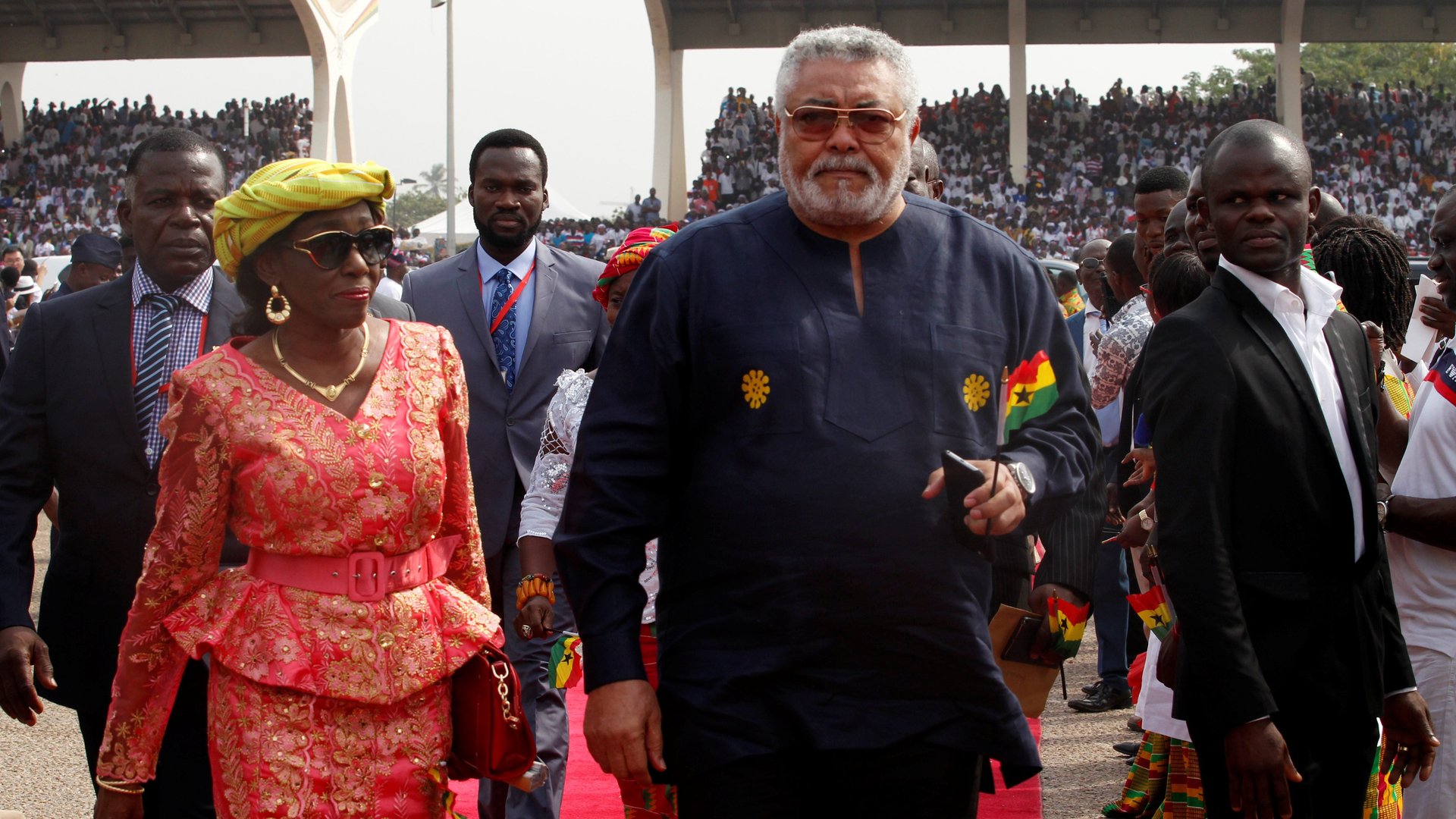Why Ghanaians are still divided over the legacy of Jerry Rawlings
Standing outside the home of former president Jerry Rawlings, in Ghana’s capital Accra, fashion designer Helena Alanyabui declared people should only focus on the good things he did. To her, he was a “selfless leader.”


Standing outside the home of former president Jerry Rawlings, in Ghana’s capital Accra, fashion designer Helena Alanyabui declared people should only focus on the good things he did. To her, he was a “selfless leader.”
“Today, some of our children know Rawlings as a wicked man, why? Because all that Rawlings came to do is not being broadcast. They are not spelling it out for the children today to know.”
Alanyabui, clad in black to signify her mourning, is referencing the mixed emotions many have expressed in Ghana since the announcement of Rawlings’ death on the morning of Nov. 12.
She puts the criticism down to current day politics, but history and political analysts explain the issues and feelings run a lot deeper.
Rawlings first came to power through a military coup as a 32-year old Air Force flight lieutenant in 1979, and then a second coup on Dec. 31 1981, and went on to rule for 20 years. The second half of that rule (1993 to 2001) was under democratic governance which he helped to usher in. He founded the National Democratic Congress (NDC), a major party in Ghana, and modeled himself as opposed to corruption, and a voice for the poor.
Under his military rule, heads of state and other high-ranking officials were executed, market women were blamed for an economic crisis, some publicly flogged, there were killings—including judges—people were jailed over corruption allegations, while others fled Ghana.
Rawlings died in hospital in Accra at 73 after a short illness. Both major political parties have suspended their campaigns ahead of the Dec. 7 general elections.
On Ghana’s streets, social and traditional media much has been said on his legacy the past few days. There has been a widespread acknowledgement of the loss, while also highlighting stories of suffering under his rule.
William Nyarko, executive director of the Africa Center for International Law and Accountability, a research and education think tank, said the news came without warning – much like his rise to power.
“You wake up, and just like he announced revolution which was sudden news, his death came as sudden news.”
Nyarko puts the sharp division between those who loved him and those who hated him, down to lived experiences and age. Some young people admire him and speak of his energy and charisma, but did not live through the military rule and the abuses under it, Nyarko says.
“But for those who were born way back in the 60s, to this day, they will most likely have a more rounded recollection of Rawlings.” Nyarko, a former journalist, pointed to a significant corruption allegation surrounding him under his rule, which he investigated.
But for faithfuls like Bob Divine Fiakpi from an Accra NDC branch, Rawlings’ often expressed dedication to fighting corruption was his defining characteristic. Fiakpi said the former president reduced corruption while in power, but since then, “it has gone up, up, up, up.”
Kuukuwa Manful, a doctoral researcher at the University of London School of Oriental and African Studies, has been thinking of the ways Rawlings affected lives.
“This is one of the few cases where there are positive stories and negative stories. There are actually two sides with Rawlings and the way he affected lives.”
There are many stories of families torn apart, people being killed, abused or disappeared or having to leave the country under his rule, she said. “But there are also stories of people that, for the first time in this country, that they’ve had a shot at a different life.”
There are stories about him breaking a sense of hierarchy seen in politics, doing manual labor alongside Ghanaians. This week, a video which was widely shared on Twitter in 2019 showing Rawlings directing traffic has popped up again, which users say point to him being a man of the people.
Through her own research, Manful found people kept coming back to an idea that Rawlings was “someone who saw people that people like him were not supposed to see”—people those in higher social and economic classes might willfully ignore.
“I don’t think Rawlings the person and his politics—that legacy is complicated. I feel like it’s how people feel about him, and I think some people who love him struggle to understand and accept the evil things he did,” Manful says.
Sign up to the Quartz Africa Weekly Brief here for news and analysis on African business, tech, and innovation in your inbox